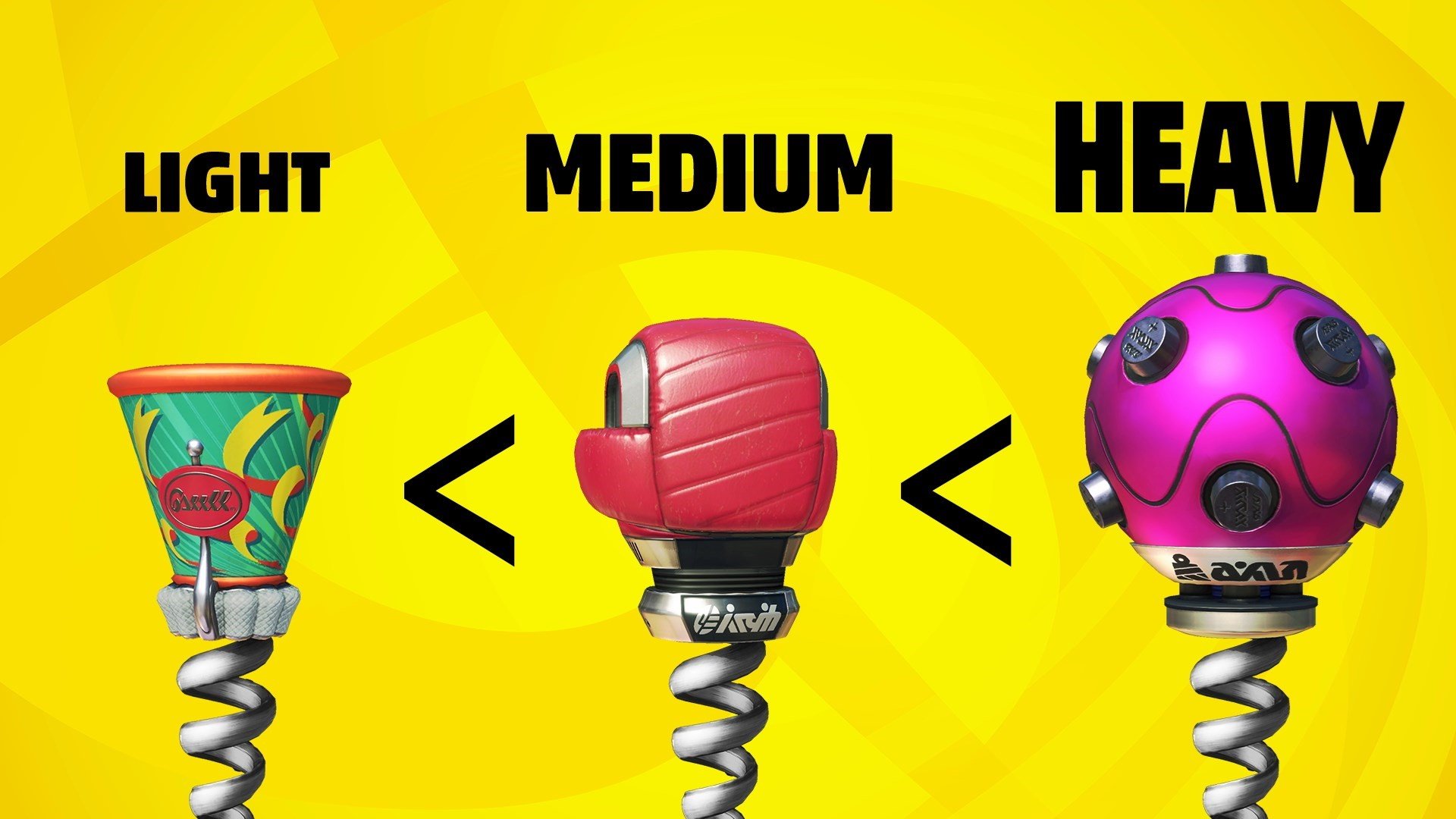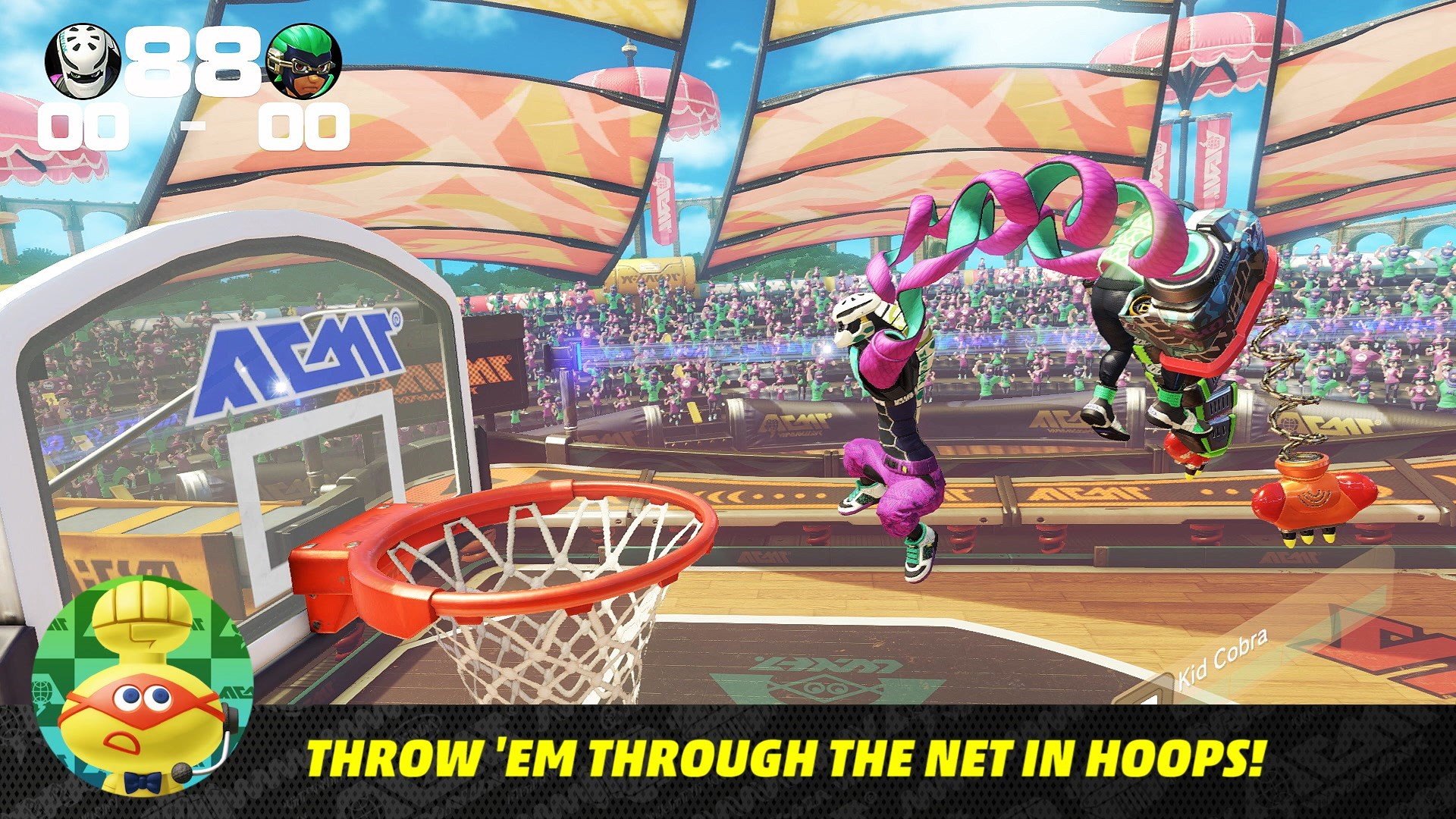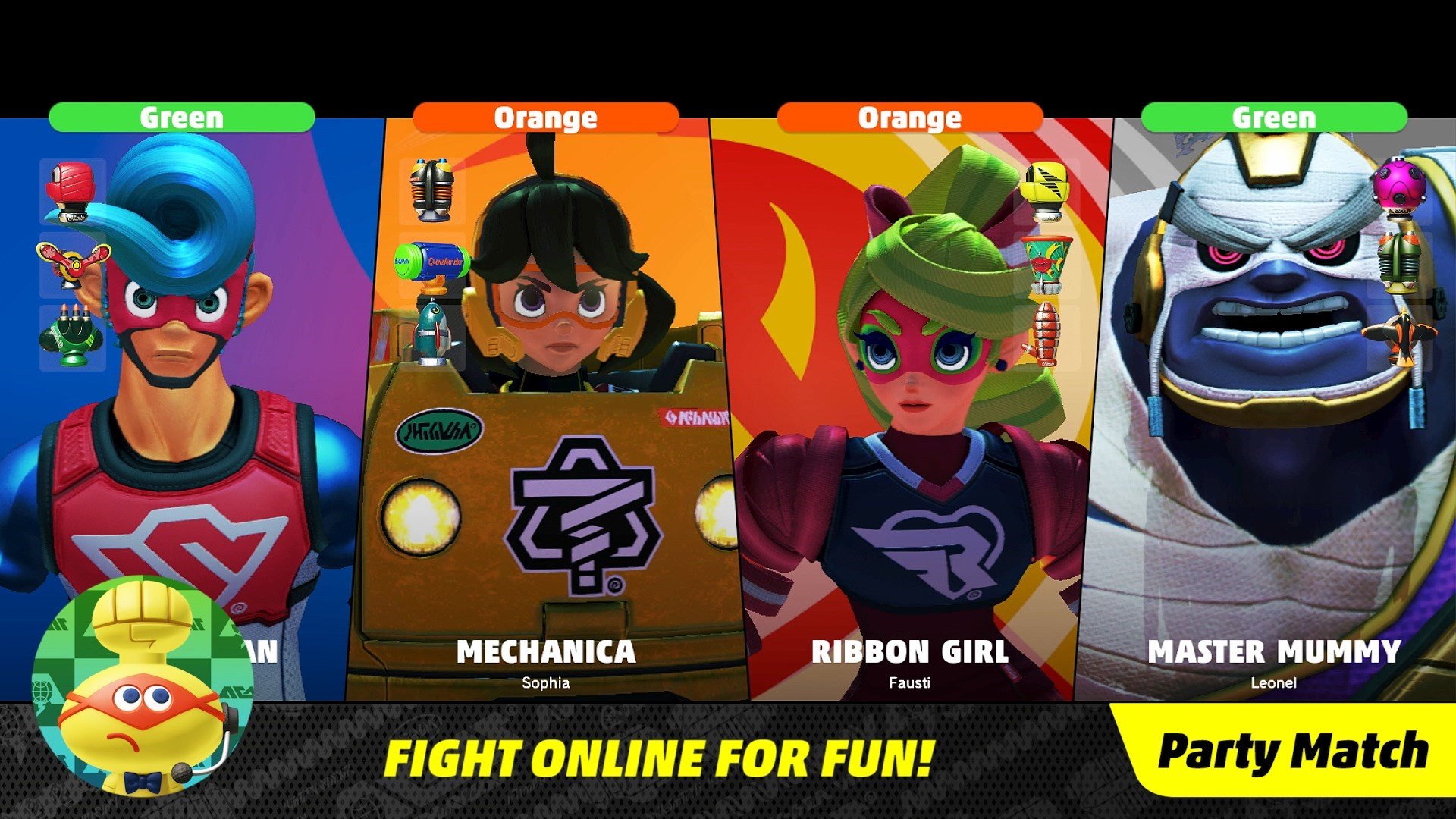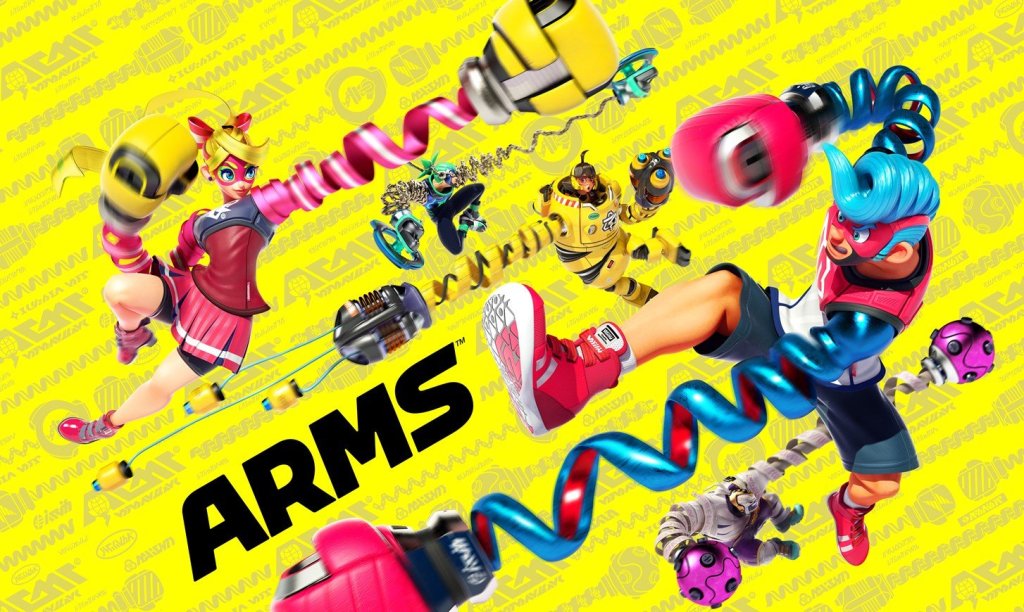It feels as though we’ve known about ARMS for a long time now. When the former Nintendo NX was showcased fully as Switch back in January, clamoring fans were handed a hybrid hardware concept, a Zelda trailer, a strange sunglassed man in a lab coat, and a motion-based boxing game known as ARMS.
Nearly half a year later Switch’s landscape looks fertile, with Zelda arrived in grand style and Splatoon 2 poised for successful sequel-launch next month. In my preview I wondered aloud if ARMS had legs, and while it’s no olympic champ like Mario Kart or ultra-marathon mutant like Sakurai’s Super Smash, it is a unique creation that, if nothing else, is fun to play with your friends. Whether or not the game wins you over long-term will depend on what you seek, so read on for a full matchmaking report.
Fight Limb from Limb

ARMS’ disposition is manifest immediately through its presentation; imagine for a moment a Call of Duty game titled GUNS, and you’ve a solid understanding the extent to which ARMS expects to be taken seriously. This is an important distinction to make from the start, because from what I’ve gathered, ARMS is all about local and online multiplayer, indulging in nonsensical motion hijinks, and not overthinking why some of its slightly undercooked systems are the way they are. What it’s not about, then, is identifying the Pro Controller as a superior input and lampooning your flailing friends, expecting its small selection of modes to match Super Smash Bros.‘ embarrassment of riches, or striving to be “the Mario Kart of fighting games.”
ARMS’ central gimmicks are twofold. Through playing and amassing in-game currency you’ll unlock and collect dozens of extendable ARMS, all unique in their functioning and attachable to any of the ten fighters on the game’s terse but varied roster. Motion controls are the main course here, and as you advance through Training and the lower levels of Grand Prix, your familiarity with effective combat muscle memory and each contraption’s unique function will slowly but steadily expand. There’s no denying the wealth of creativity on display regarding the ARMS themselves; everything from the miniature rocket-launching Triblast, to the emblazoned boomerang Ramram, and the generous selection of heavy-hitting options such as the bulky Whammer or the electrifying, often devastating Megawatt are all viable options.
It probably sounds like I’m speaking another language, but consider that a positive – more than anything else, ARMS’ selection of, well, ARMS does double duty as both its strongest mechanical feat and a vessel for, of all things, extremely effective worldbuilding. It’s not difficult to imagine the game’s cast maintaining their robo-limbs between matches pod-racer style, taking a wrench to damaged components or asking pit crews to plug a leak or swap in a new hydrospanner. Sadly delights such as these are largely glossed over, but a bit of imagination goes a long way nonetheless.
Man Versus Machine

With ARMS themselves as the highlight of ARMS you’ll need a means of obtaining them, and while all game modes offer up currency for scoring more ARMS, the Grand Prix is where you’ll spend a lot of your non-multiplayer time. The mode takes cues from your standard fighter Arcade, requiring you clear ten bouts in a row (generally best-of-three) before advancing to the next round. It’s familiar fun, and as I progressed through the first and second difficulty settings (there are seven in total), an unfortunate reality began to sink in. While ARMS’ motion controls are a blast for local multiplayer, they’re both an inferior choice and certifiable pain when trying to best the toughest CPUs.
How severe is the disparity? Well, consider this. The first two difficulty settings are fairly simple with any input, though level two had me sweating a bit by the time I cleared the final boss. Level three proved to be a rewarding struggle with motion, and like MotionPlus stablemates Skyward Sword and Wii Sports Resort, the palpable sensation of physically “preparing” for a fight is both immersive and satisfying. The controls demand precise input, and since the input is literally you, consistent form and execution are required. It took me quite a while to figure out, for example, that the nature of Ramrams’ outside or inside curvature was determined precisely by the angle at which I launched my real-life arms; a straightforward thrust, especially as difficulty increased, was not itself an effective strategy.
The beauty of the motion input is the way it seamlessly convinces you to impersonate Muhammad Ali in real life: ARMS is among the first motion titles since Wii Sports that hasn’t left me feeling self-concious, and instead turned my living room into what I’ve no doubt ARMS TV commercials are going to be exactly like. For better or worse it’s a motion milestone, so expect to ride ARMS’ Joy-Con controls as far as they’ll take you.

Unfortunately there’s a substantial flaw to ARMS, namely that it’s distinctly possible the motion controls won’t take you very far at all. The game requires clearing level four difficulty in Grand Prix before Ranked Match online is accessible, and in my experience doing so with motion controls felt quite literally impossible. On the contrary, when frustration overtook me and I synced up my Pro Controller, not only did I clear level four easily, but I advanced through the entire procession of ten fighters without a single loss. I had never played ARMS with button controls until that moment, and it was then that I realized, upon later returning to motion, that a noticeable volume of precision strikes, dodges, and in particular guards are dropped or completely lost against buttons when flailing about.
While it’s true you can probably technically blame this on the player, the entire notion of motion is to feel intuitive and natural. In particular, the contrast of guarding by clicking the Pro Controller’s left stick, a miniscule and instant action, versus having to physically cross the Joy-Cons (and half the time register a two-handed grab by mistake) offers an obscene and not-ignorable advantage to the player using an input with buttons. Not only does this discourage the use of motion in single player beyond level four or so of Grand Prix, it takes the fun out of multiplayer unless everyone playing agrees to motion or button-only across the board. Of course, this then requires an abnormal volume of either Joy-Con sets or Pro Controllers respectively, at which point you may find yourself wishing you’d simply hooked up your Wii U for some Super Smash Bros. instead.
Deja Vu All over Again

With the basics covered it’s time to talk content, and while ARMS isn’t devoid of options, for a $60 game its volume of modes and their respective depth is lacking. Grand Prix offers seven difficulty settings across 10 fighters as-detailed, and from there you have Versus, Party Match, Ranked Match, and “Friends” for besting your pals online. Versus is where the trove of local modes is held, and aside from standard Fight and 2-on-2 Team Fight there’s V-Ball (short for Volleyball in ARMS lingo), Hoops, Skillshot, and 1-on-100.
Hoops and V-Ball are fun when they appear interspersed within Grand Prix, but are largely self-explanatory and simplistic otherwise – it’s unlikely you’ll spend much time with them save for a change of pace. Skillshot is interesting as it requires the targeted destruction of physical targets, in tandem with management of an opponent on the other side of the stage performing the same and, more than likely, aiming his ARMS at your head. Skillshot brings needed strategic depth against friends, but is the most maddening experience I’ve had in a while when it appears in Grand Prix on harder difficulties, easily to the point of feeling unfun. 1-on-100 is a diamond in the rough, taking cues from Smash Bros. for all-out survival against comparatively weak swarms that slowly overwhelm and test your skill as the match progresses.

And ultimately, that’s about all there is to ARMS. Online modes work as expected, with a particularly clever Ranked Match that allows you to play locally and access the entire game while you wait for a pair. Party Match facilitates standard no-pressure encounters, and I’m glad to report that the online experience is far more Mario Kart 8 than Super Smash Bros. for Wii U: in other words, no lag. Even then, a handful of odd issues plague ARMS, from the laggy, framey replay system that pales in comparison to that of Mario Kart 8, to the graphics and visual presentation that, while sporting high quality character models at 1080p and 60fps, overall manage to look worse than most late-era first party Wii U games. It’s difficult to explain, but the presentation lacks the full, usual Nintendo polish; there’s a decidedly Overwatch feeling to the game, but without that title’s pristine Pixar-like production value. In the end ARMS just doesn’t feel premium, warts and all and despite its multitude of strengths.
Conclusion
ARMS is without doubt a mixed bag, but its laundry list of upside and paid-off risk-taking do render it worthwhile if you crave creative and purely fun local multiplayer on Switch. You’ll want to convince your friends to go motion or button-only across the board of course, and while ARMS’ online modes seem stable, somehow I suspect the Ranked Match will seed more frustration than enjoyment for most players. That is, if the formidable challenge of Grand Prix at higher difficulty is any indication.
There’s also value to consider, and at $60 ARMS doesn’t come close to delivering the dizzying array of content that the traditionally same-priced Super Smash Bros., Nintendo’s other prominent fighter, brings to the table with each and every entry. Nintendo president Tatsumi Kimishima has proven staunch since his appointment, and be it $40 Fire Emblem DLC or the $60 ARMS, you’re advised to tread carefully when it comes to opening your wallet. If you already know you want ARMS then by all means buy it and have a blast. But if you’re on the fence or expecting the endless enjoyment multiplayer Nintendo titles usually provide, ARMS is unfortunately far from a must-buy.
Griffin Vacheron is an Editor at GameRevolution. You can follow him on Twitter @novacav.
A Switch copy of ARMS was provided by its publisher. This game is exclusive to Switch.
-
ARMS' main premise delivers: customizable, swappable ARMS are heaps of fun
-
Motion controls are serviceable and work, and are most enjoyable in a multiplayer setting
-
Fighter designs and character model graphics are excellent
-
Button controls are far more effective than ARMS' Joy-Con motion
-
Challenge is good, but occassional single player moments are truly maddening
-
Overall visual presentation, while pleasant, lags behind even Wii U first party Nintendo titles
-
For $60, there's not enough value and depth here
-
Instant replay is choppy and generally poor vs. Mario Kart 8







